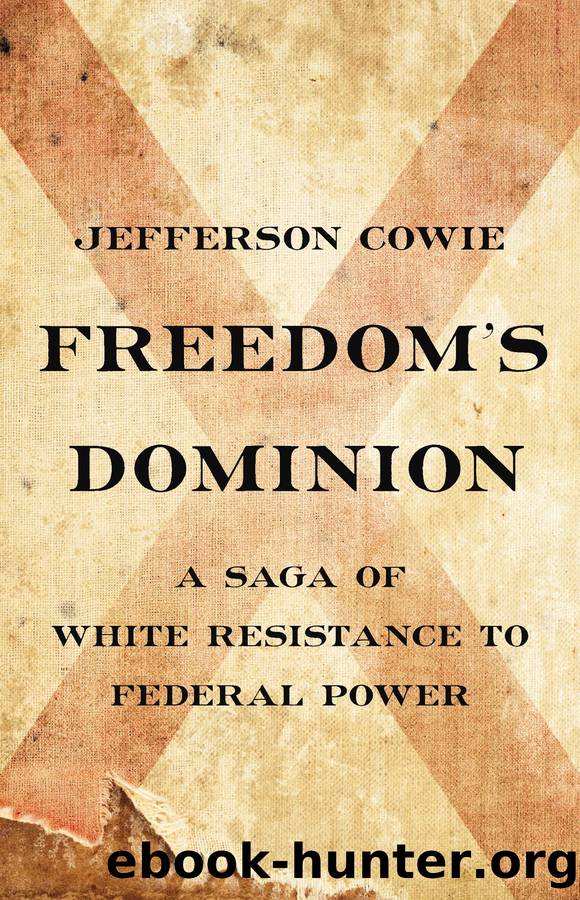Freedom's Dominion by Jefferson Cowie

Author:Jefferson Cowie [Cowie, Jefferson]
Language: eng
Format: epub
Publisher: Basic Books
Published: 2022-11-22T00:00:00+00:00
chapter fourteen
A New Deal for Southside?
Mr. nolan, a white tenant farmer in Dale County just south of Barbour, passed away sometime around 1900. His wife, Nancy Nolan, a young mother of three with nowhere else to go, took over her husbandâs labors and combined them with her own into the formidable combination of planting cotton, tending a household, mothering children, harvesting the crop, and paying the interminable debt. Her nine-year-old son had to pick up his fatherâs plow and carve his own furrows through the barren wiregrass soil. The widow Nolan tried for five years to make a go of working her plot before finally giving up on tenant farming. She and her kids packed up what little they had and abandoned the land, making their way over the northern county line. They finally settled in Eufaula. There she took up with the new textile mill, an option available to only whites throughout the South. At the Eufaula mill, she worked all night and had two of her young boys working in the mill during the day. âIt was bad,â she recalled.1
The mill was a grimy place. A layer of tobacco spit coated the Eufaula mill room floor. Machine oil, grease, and a thick fog of humidity from belching steam covered everything else. No decent toilets were to be found, just a single, wretched outhouse that served all the mill workers. There was no running water, and ill-nourished and ill-rested workers shared water buckets, dippers, and disease. Chronic bronchitis, tonsilitis, asthma, and a host of other respiratory ailments were rampant. As in all mills, the exposed belts, grinding gears, and machine blades threatened life and limbâand were known to take both. âIt is a fearful sight to see one of the belts on these high-speed machines break or come off and whip and curl like a snake,â remarked one textile worker, or to see a pulley âjump off a shaft and come across the floor like a cannonball.â White men, white women, and white children all worked in dreadful conditions. At the end of twelve hours of drudgery, repeated six days per week, the steam whistle finally released the operatives into the outside world, where they breathed the Eufaula air choked with coal dust from the millâs power plant. Early the next morning, they returned to do it again.2
The Great Depression and the New Deal challenged the structure, practice, wages, and power relations in American industry. By 1934, spurred on by the official recognition of unions in the National Industrial Recovery Act, workers walked out in an enormous region-wide strike that swept through textile mills across the South. The Eufaula mill, however, never went on strike, and in fact, even the workers defined themselves in opposition to the New Deal. From the grimy turn-of-the-century mill sprang a remarkably robust brand of paternalism, one that workers came to regard as a marvel and a wonder in employment relations. It also created a unique version of racialized anti-statism that kept the federal powers at bay.
Download
This site does not store any files on its server. We only index and link to content provided by other sites. Please contact the content providers to delete copyright contents if any and email us, we'll remove relevant links or contents immediately.
Zero to IPO: Over $1 Trillion of Actionable Advice from the World's Most Successful Entrepreneurs by Frederic Kerrest(4567)
Machine Learning at Scale with H2O by Gregory Keys | David Whiting(4312)
Never by Ken Follett(3954)
Harry Potter and the Goblet Of Fire by J.K. Rowling(3856)
Ogilvy on Advertising by David Ogilvy(3621)
Shadow of Night by Deborah Harkness(3366)
The Man Who Died Twice by Richard Osman(3077)
Book of Life by Deborah Harkness(2937)
The Tipping Point by Malcolm Gladwell(2920)
Will by Will Smith(2919)
Purple Hibiscus by Chimamanda Ngozi Adichie(2851)
0041152001443424520 .pdf by Unknown(2845)
My Brilliant Friend by Elena Ferrante(2829)
How Proust Can Change Your Life by Alain De Botton(2812)
How to Pay Zero Taxes, 2018 by Jeff A. Schnepper(2654)
Hooked: A Dark, Contemporary Romance (Never After Series) by Emily McIntire(2553)
Rationality by Steven Pinker(2363)
Can't Hurt Me: Master Your Mind and Defy the Odds - Clean Edition by David Goggins(2339)
Borders by unknow(2313)
